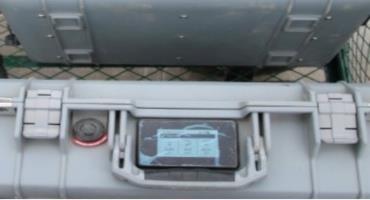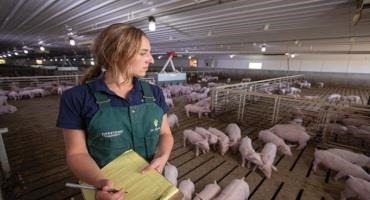Plans to disrupt the Nebraska beef industry began in Hanoi, Vietnam.
Rancher Rusty Kemp was on a 2019 trade trip with Nebraska Gov. Pete Ricketts. He’d been griping about the meat industry when he remembers the governor turning to him and saying, Well, let's figure out how to fix this. Get after it.
Kemp started thinking about the problems in his industry. He remembered how a fire at Tyson's Holcomb plant in Kansas halted more than 5% of the nation’s daily beef production and affected prices. Later, cyberattackers paused 20% of the country’s meat by hacking processing giant JBS.
Trey Wasserburger, another Western Nebraska rancher, had also been feeling the vulnerabilities of the meat system. Especially through the pandemic.
"We lost a third of our income overnight,” he said. “And then I watched a third of my equity leave in a matter of a week."

The system didn't feel fair. All that risk and effort to get a steer ready for slaughter, and then accepting whatever price a processor offers.
"So,” Wasserburger said, “we have five years invested and in the last 48 hours we give it away."
Dissatisfied ranchers
It got this way partly through concentration. When Wasserburger’s wife’s grandfather was in business, there were 13 buyers in Omaha. And if he wasn’t interested in them, Denver buyers could offer good money for the cattle he’d raised. Forty years later, Wasserburger deals with one.
"And sometimes," Wasserburger said, "he doesn't pick up the phone."
President Joe Biden has released plans to crack down on consolidation in the meat industry. Four companies control 80% of the nation’s beef.
U.S. Agriculture Secretary Tom Vilsack has said that farmers and ranchers need more options to sell their animals. Kemp and Wasserburger want to be a part of that change. Former executives from Cargill — one of the Big Four meatpackers — have joined the effort.
The team plans to build a new plant called Sustainable Beef to slaughter 1,500 cattle a day — just a quarter of what Tyson goes through in one of its nearby plants.

The Sustainable Beef plant is proposed to be built on this field east of the city of North Platte. The 80-acre site is a former wastewater holding pond currently owned by the city. It could house a facility that processes 1,500 cattle daily.
The vision isn’t intended to replace the Big Four. Rachael Kemp, Rusty’s wife, ranches with him in western Nebraska and previously worked at Iowa Beef Processors, a packing company that Tyson now owns. She says she’s not anti-packer, because the country needs them to put food on the table.
Rather, the plan is to give ranchers in the region an alternative and boost the local economy with its own factory-scale butchering plant. It’s not a new idea. Plenty of ranchers have gotten frustrated and tried to rally. A group in Iowa did just that — and the plant got bought out by one of the Big Four.
"I don’t know how many times I’ve had producers call me and say, 'Hey, we’re building a packing plant,'" Wasserburger said. "I’ve probably been a part of four or five groups."
But things are falling into place for this project. Gary Person heads up the North Platte Chamber of Commerce and he leaped at the chance to host the plant. After all, it promises to employ 875 people with jobs that pay $50,000 a year with benefits.
Location, location, location
North Platte has been a struggling Midwestern town in recent years. At one point, it was the fourth-largest town in Nebraska. Today, it’s ninth.
It’s not for lack of industry. Union Pacific built the world’s largest rail yard there in 1948. But layoffs at the transport company and the weakening of rail have dulled the shine on that infrastructure.
Click here to see more...